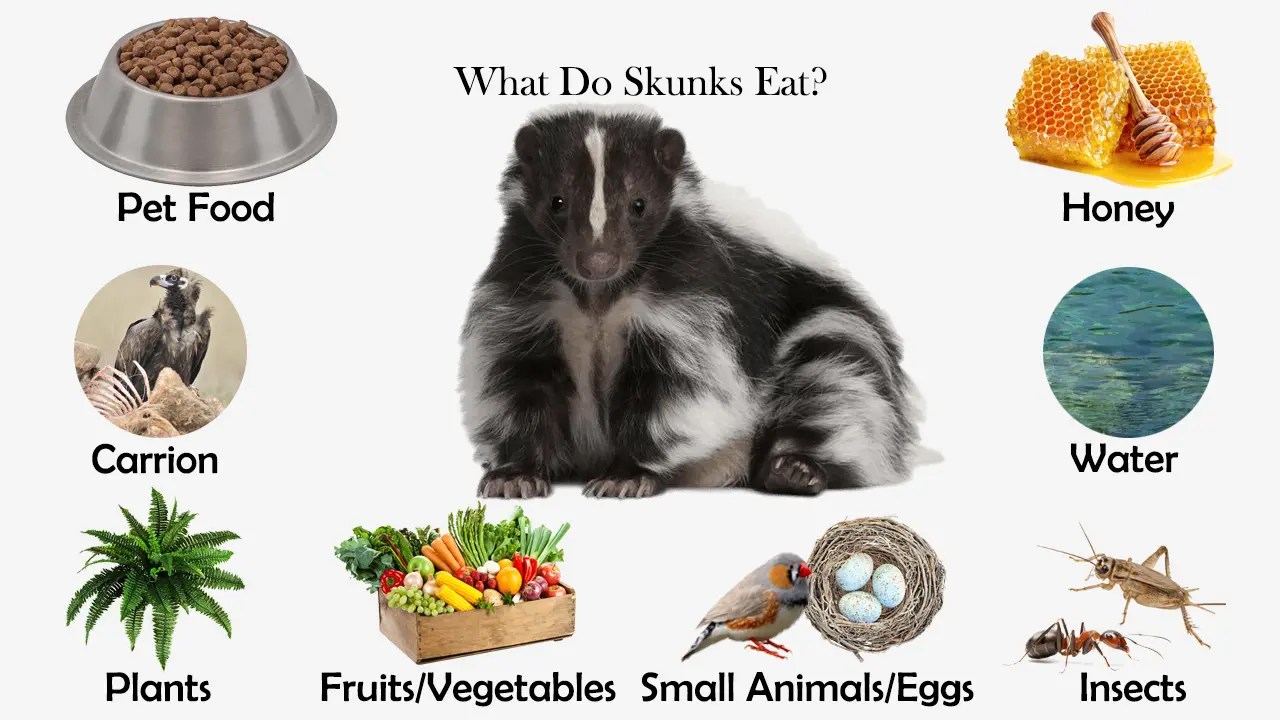Understanding The Dietary Preferences Of Skunks

Skunks are often misunderstood creatures, primarily known for their strong odor. However, their dietary habits play a crucial role in their behavior and habitat. Understanding what do skunks eat can help us appreciate these fascinating animals and their role in the ecosystem. Skunks are omnivores, meaning they have a diverse diet consisting of both plant and animal matter, which allows them to thrive in various environments. By exploring their eating habits, we can learn more about their ecological significance and how they contribute to maintaining balance in their habitats.
The diet of skunks varies based on their geographical location, seasonal changes, and food availability. Generally, they are opportunistic feeders that will consume whatever food sources are readily available. This adaptability makes them resilient in the wild, as they can shift their diet according to what they can find. From insects to fruits, skunks have a diverse palate that helps them survive in different environments.
In this article, we will delve into the specifics of what do skunks eat, examining their favorite foods, how their diet impacts their behavior, and what it means for their role in the ecosystem. Whether you are a wildlife enthusiast or simply curious about these unique animals, understanding their dietary preferences can enhance your appreciation for skunks and their contribution to biodiversity.
What Are the Main Components of a Skunk's Diet?
Skunks are known for their diverse diets, which can include a variety of food sources. The main components of what do skunks eat include:
- Insects: Skunks love to eat beetles, crickets, and grasshoppers.
- Fruits: They enjoy berries, apples, and other seasonal fruits.
- Small mammals: Skunks may prey on rodents and other small animals.
- Plant matter: Leaves, roots, and nuts are also part of their diet.
How Do Skunks Forage for Food?
Skunks are nocturnal animals, which means they are most active during the night. Their foraging behavior is quite interesting:
- Skunks use their keen sense of smell to locate food.
- They often dig in the ground to uncover insects and roots.
- Skunks will also scavenge leftovers from other animals.
Why Do Skunks Eat Insects?
One of the most significant aspects of what do skunks eat is their consumption of insects. Insects provide essential protein and nutrients that are vital for skunk health. Some reasons skunks prefer insects include:
- High availability during warmer months.
- A good source of protein for growth and reproduction.
- Insects help control pest populations in the ecosystem.
What Fruits Do Skunks Prefer?
Fruits form a crucial part of a skunk's diet, especially during the warmer months when they are in season. Skunks are known to enjoy:
- Berries (e.g., blackberries, blueberries, strawberries)
- Apples and pears
- Grapes and melons
Do Skunks Eat Human Food?
Skunks are opportunistic feeders and may raid garbage cans or compost bins in search of food. Human food can attract skunks, but it is important to understand that:
- Feeding skunks can lead to dependency on human food sources.
- It can cause health issues for skunks due to unhealthy diets.
- Skunks may become more aggressive if they associate humans with food.
How Do Skunks Impact Their Ecosystem?
By understanding what do skunks eat, we can better appreciate their role in the ecosystem. Skunks contribute to the balance of their habitats by:
- Controlling insect populations
- Dispersing seeds through their consumption of fruits
- Providing prey for larger predators
What Should You Do if You Encounter a Skunk?
Encountering a skunk can be a surprising experience. If you find yourself face-to-face with one of these creatures, remember:
- Stay calm and avoid sudden movements.
- Do not corner or provoke the skunk.
- Give the skunk a way to escape if it feels threatened.
How Can You Keep Skunks Away from Your Yard?
To prevent skunks from invading your space, consider the following tips:
- Secure trash cans with tight-fitting lids.
- Remove pet food and water dishes outside.
- Seal any holes or gaps around your home.
Conclusion: Embracing the Role of Skunks in Nature
Understanding what do skunks eat is essential to appreciating their role in the ecosystem. These unique creatures contribute to pest control, seed dispersal, and serve as prey for larger animals. By respecting their dietary preferences and behaviors, we can coexist with skunks while supporting a healthy and balanced environment. So next time you encounter a skunk, take a moment to admire their adaptability and the essential role they play in nature.
ncG1vNJzZmirn521b6%2FOpmasp5idu6bD0qCcq7FkZMSprdNmm6hlo6DCr7fSZpyarF6dwa64